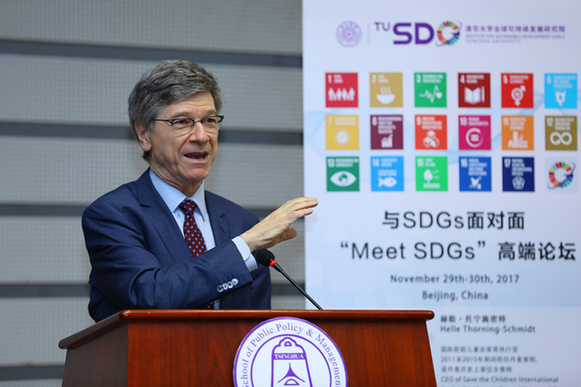Institute for Sustainable Development Goals, Tsinghua University
 Forum on Sustainable Development and Modernization of Governance 2017 hosted by the Institute for Sustainable Development Goals, Tsinghua University
Forum on Sustainable Development and Modernization of Governance 2017 hosted by the Institute for Sustainable Development Goals, Tsinghua UniversityEstablished on April 26, 2017, the Institute for Sustainable Development Goals , Tsinghua University (TUSDG) is a university-level non-profit research institute housed in the School of Public Policy and Management of Tsinghua University to carry out teaching and research activities in collaboration with other related schools and departments. TUSDG aims to:
- Conduct interdisciplinary research on the overall framework, policy implementation, and specific objectives of UN Sustainable Development Goals(SDGs);
- Facilitate experience exchanges on SDGs among UN agencies and international counterparts;
- Enhance experience exchanges and mutual learning in SDGs policy and practice among different countries;
- Become a leading specialized research institute on SDGs with international academic and policy influence.
Meanwhile, the TUSDG strives to cultivate versatile professionals specialized in the implementation of SDGs through its Master’s degree programs and various short-term training programs with an innovative curriculum and flexible program design. In addition, the TUSDG aspires to become a leading think-tank in China on SDG-related issues through partnerships with relevant government departments.
The Foundation, in collaboration with business partners, makes research donations for area studies and new economic development at the TUSDG.
Project Progress
Research Project I
1) Policy Suggestions to Promote Financing Support from SMEs and GEMs for Industrial Internet Businesses
This project focuses on promoting the support of capital markets for the development of the industrial internet. First, the concept and characteristics of the industrial internet are identified and analyzed. Second, the industrial internet at home and abroad are compared in terms of the development path, characteristics, influence, and access to capital markets. Finally, through surveys and interviews, suggestions are made to improve the support of capital markets in China for industrial internet businesses.
2)Legal Remedies and Policy Suggestions for Malicious Trademark Squatting in New Economic Fields
Based on the legal liabilities of malicious squatting and hoarding of trademarks and an in-depth understanding of the cost and status quo of trademark registration for modern businesses, this project is expected to discuss rules for trademark coexistence in online environments in new economic fields and responses to malicious squatting by e-commerce platforms. The project also aims to study how new internet technologies can be applied in trademark protection and give specific policy suggestions.
Research Project II
1) Research on the Development of Housing Service Platforms Based on Internet Technologies
This project, through systematic research and analysis, focuses on the underlying reasons and logic for the intelligentization, networking, and platformization of organizations for housing services, and characteristics, highlights, challenges, and demands for platform construction and operation. It helps other social sectors understand the operations and social values of “intelligent housing service platforms” systematically and correctly. It also assists government departments in rolling out relevant policies to provide regulation, guidance, incentives, and support for the construction, operation, and development of these platforms.
2) Research on Long-term Renting Against the Backdrop of Encouraging Both Rentals and Purchases in China
As a favorable form of a sharing economy, distributed long-term renting is beneficial for reinvigorating urban property inventory, addressing the pain of the long commute between home and work, and resolve the imbalance between housing supply and demand. In recent years, diversified enterprises and financial resources have flocked to this sector, but some of them ultimately failed. Faced with the difficulties of financing, management, safety, and profits, these enterprises have been doubted and criticized by the public. Through systematic analysis, this project aims to elaborate on the operation of distributed long-term renting to shape social recognition of its social value and assist government departments in formulating relevant policies for guiding, incentivizing and supporting the sound and sustainable development of distributed long-term renting in China.
Research project III
Development, Social Impact, and Policy Recommendations of the Gig Economy in the Era of Internet
This research conducts an in-depth analysis of the essence, development, economic and social values, and future trends in the gig economy, filling the research gap on the gig economy in the Internet era and thus showing academic, professional, and policy significance. Moreover, it provides constructive suggestions and advice on helping internet platforms better promote the gig economy to empower economic and social development, promote employment, and improve people’s livelihood. Through analyzing case studies, the research analyzes the gig economy, represented by Tik Tok, to highlight its active role and value in promoting high-quality economic development, promoting “new types of employment” which is an issue of concern for the Chinese leadership, and achieving employment security.
Project Outcomes
To be updated.